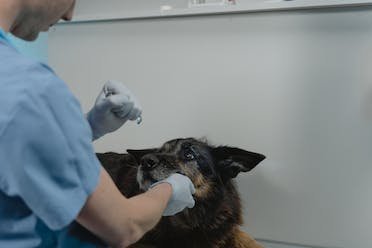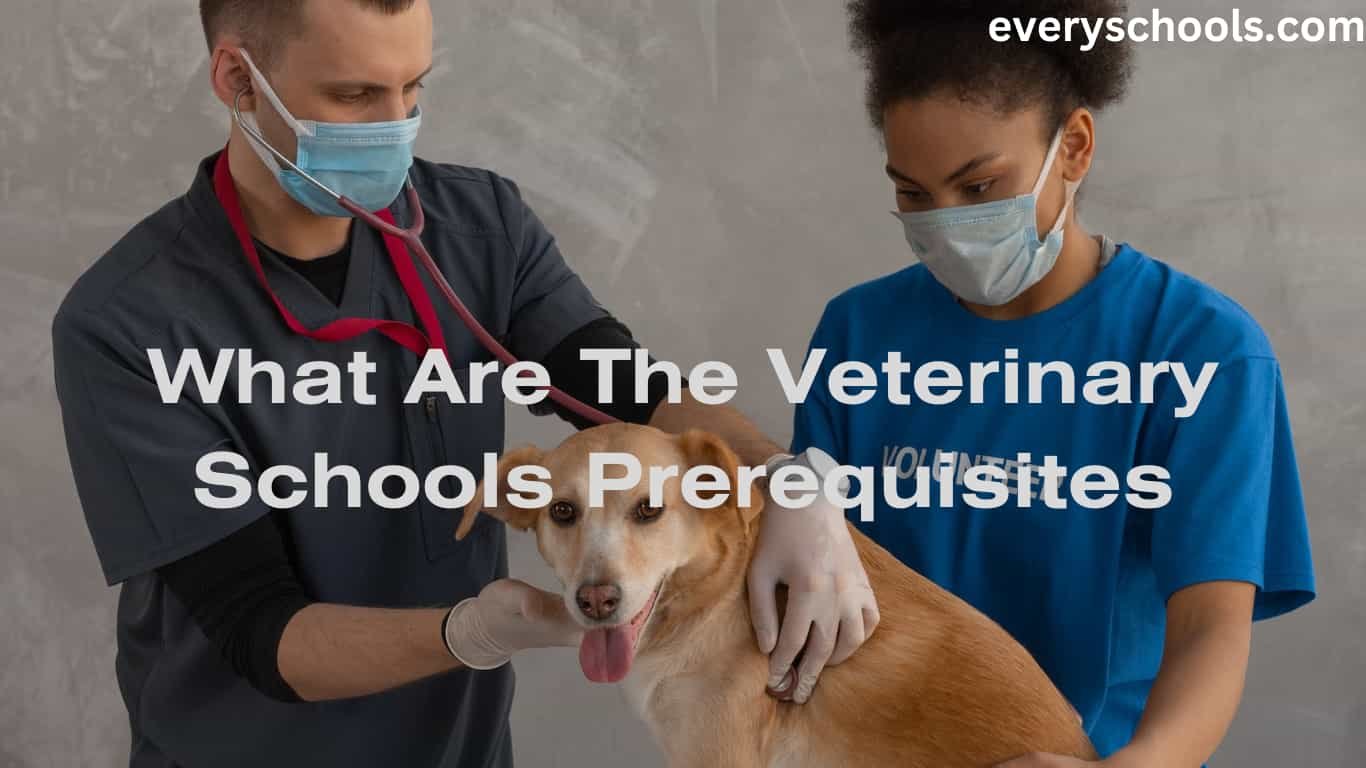The moment you decide you want to study veterinary, you know you are expected to go through a lot of hard work and many hours of study. However, your efforts will be worth it in the end. After all, being a veterinarian is one of the most rewarding professions in the world.
Even the easiest veterinary school, to get into has its requirements, that must be met by all applicants. To enroll in the best veterinary schools, you must learn more about what veterinary schools prerequisites are. From prerequisite courses and experience to grades and examination scores, we have got you covered.
Therefore, In this overview, we will provide essential information and guide on what veterinary schools prerequisites are. Also, we will assist you every step of the way so you can meet all the requirements the veterinary school admissions process calls for.
Related: Best Veterinary Schools in Chicago
Table of Contents
HOW TO BECOME A PROFESSIONAL VETERINARIAN?
As mentioned earlier, veterinary is one of the most rewarding careers. Therefore, below are some steps to start pursuing a career as a veterinarian:
1. EARN A BACHELOR OF SCIENCE DEGREE
To become a professional veterinary, you must earn a bachelor of science degree in veterinary or in a relevant field. This program often requires four to five years.
2. APPLY FOR VETERINARY SCHOOL
You can also apply to veterinary schools. Most veterinary schools offer associate degrees (usually two years) or certifications. Veterinary schools will provide you with in-depth veterinary studies.
3. PASS LICENSURE EXAM
To practice and become a professional, you must pass the state licensure exam. The cost fee for a state veterinary exam varies from state to state. However, the average fee is $155.
4. COMPLETE AN INTERNSHIP
As a fresh graduate, it is recommended, that you complete an internship or apply for one. Doing this will provide you with a first-hand experience.
5. CHOOSE A SPECIALIZATION
Also, it is crucial that you decide on a specialization in the industry. This will provide you with an idea of what type of veterinary you want to become.
6. GAIN BOARD CERTIFICATION
Finally, it is vital that you gain board certification. Most veterinary board certification stands as proof that you have the approval to practice in the country. So, obtain a board certification.
Related: Best Veterinary Schools in Missouri
HOW DO I CHOOSE WHICH VETERINARY SCHOOL TO APPLY TO?

There are many important factors to consider when deciding which veterinary schools to apply to. It may be a time-consuming and stressful process. However, it is one you should consider right away before you begin the actual application process, so you can have time to fully consider and review your options.
Factors to Consider when choosing a Veterinary School include:
- School tuition and fees
- Cost of living
- Location
- Where you have the best chance of acceptance
- How does the school’s veterinary program rank internationally
- Environment type (supportive, professional, or on your type)
- Is the program internationally accredited, allowing you to work internationally
- Rate of successful graduates.
Related: Best Optometry Schools in Kansas
WHAT ARE THE VETERINARY SCHOOLS PREREQUISITES?
Below are some of the most common veterinary school requirements for getting into a vet school:

1. AGE PREREQUISITE
There is a saying that “it is never too late to follow your dream.” This is very true for career changes as well. If you feel right about spending up to four years in a professional school and think the career is the right fit for you, then age is just a number.
One of the veterinary schools prerequisites is the age factor. The minimum age for admission to a veterinary school ranges from 20-30. But that does not mean that you can not apply if you are older than 30. In fact this is relatively young for classes today. For example, most classes in recent times have students in their 40s and 50s
2. GPA REQUIREMENTS
Applicant GPA is another vital factor for veterinary school prerequisites, which is why many students worry about veterinary school GPA requirements. Every veterinary school in the world has its own GPA requirement.
To get an idea of what you are up against, here is some information to indicate what kind of GPA requirement you must aim to meet and exceed a veterinary GPA requirement.
- Cornell University College of Veterinary Medicine (USA)
GPA Requirement: 3.7
- University Of London – Royal Veterinary College (United Kingdom)
GPA Requirement: 3.2
- UC Davis School of Veterinary Medicine (USA)
GPA Requirement: 3.0
official site: vetmed.ucdavis.edu
- University of Guelph Veterinary Studies (Canada)
GPA Requirement: 3.0 on a 4.0 scale
Official site: uoguelph.ca
- University Of Glasgow (United Kingdom)
GPA Requirement: 3.4%
Official site: gla.ac.uk
In general, setting the minimum GPA requirement at 3.0 seems to be a normal practice among many veterinary schools in the world. It is also normal to see different GPA standards for in-state and out-of-state applicants.
Related: Best Ranked Optometry Schools in Missouri
3. COMPLETE YOUR UNDERGRADUATE COURSE PREREQUISITES
Undoubtedly, most Veterinary schools prerequisites vary from school to school. For instance, a certain set of courses might meet Cornell University’s College of Veterinary Medicine’s requirements but not other programs.
These are some general courses you will need to complete for veterinary schools, including Animal Science, Biology or zoology, Biomedical Science, Biological science, Anatomy, Life science, and others.
4. STANDARDIZED TESTS
Many veterinary school requisites enable students to take the Graduate Record Examination (GRE) to measure their overall readiness for graduate school. The Graduate Record Examination (GRE) is usually requested by universities in the U.S.
It is mainly for students who are enrolling for a master’s degree. Each school has its requirements for GRE scores, so take time to check the requirements for your top selections. Take GRE practice tests and start studying in advance to be well prepared and to achieve a good result.
Related: What are the Best Veterinary Schools in Michigan?
5. STUDENTS’ EXPERIENCE
It is crucial to have experience with animals or health care to get into veterinary school. It is one of the veterinary schools’ experiences. So, if you are passionate about animals, vet schools want to see proof. Admission boards seek out an applicant who has demonstrated their passion by volunteering at shelters or getting jobs at animal clinics.
Most veterinary schools require a certain number of hours of veterinary experience, a minimum requirement of 150 veterinary experience hours, while some schools do not have a minimum number of hours, but will look for an understanding of the profession and what you have learned and gained from the experiences.
Research is also an advantageous type of experience, and working in a research environment may help students develop skills important to veterinarians.
6. RECOMMENDATIONS
Many veterinary schools requisites include letters of recommendation. Veterinary schools’ letter of recommendation requirements can be confusing because they differ across schools.
However, some schools require two letters of recommendation; one from a veterinarian professional familiar with your animal experience, and one from your science professor familiar with your academic ability.
However, be sure to check the requirements at your top choices to know how many letters you will need. Also, to get the best recommendation letter possible, get to know your science professors and form professional connections with them.
Related: Best pre med school in the US
7. PERSONAL ESSAY
In addition to application materials like documents of your vet experience, most veterinary schools requisites also require you to submit a personal essay or statement. Typically, your personal essay will be a statement related to your career goals, personal qualities, and why you want to pursue a career in veterinary medicine.
Many vet schools require a minimum of 300 to 1000 words for your personal essay. Your essay should be well-written and well-structured.
8. LEADERSHIP AND COMMUNICATION SKILLS; AND CO-CURRICULAR ACTIVITIES
Many vet schools require prospective students to gain leadership experience and communication skills, as well as to get involved in student club activities, such as pre-vet club which will provide students with various opportunities to serve in their communities. If this does not work out, you can get people together and start a club of your own.
Related: Recommended nursing schools in Australia to study
9. BE MINDFUL OF APPLICATION DEADLINES
Applying for and gaining admission into vet schools requires preparation and planning. VMCAS is the centralized application service for colleges of veterinary medicine.
Here is an overview of the VMCAS application cycle:
- January: VMCAS application opens
- May: First day of submission
- September 15: Deadline
- October-February: Veterinary school interview season
- February-April: Admissions decisions are announced.
Related: Outstanding Medical Schools in New Mexico
IS RESEARCH EXPERIENCE REQUIRED FOR VETERINARY SCHOOLS?
In general, most veterinary school requisites include both research and hands-on experience. If this is the case, then it is important that you have documented experience that validates your interests in the research field. However, that does not indicate applicants whose choice of school does not require research will not benefit from a research background.
As a veterinary, your job will involve research, Whether through the process of continuing education, which requires you to study the published findings of research groups. Or as you seek to determine your clients conditions.
Related: Best pharmacy schools in Canada
HOW DOES EMPLOYMENT REFLECT ON MY VETERINARY SCHOOL ADMISSION?
Many admission committees understand that maintaining academic performance while holding down a job is hard work. That is, most admission boards recognize that the time you work necessarily means you have less time for your studies and other extracurricular activities, which is very understandable.
However, if an applicant has been able to do both well, it is a sign/demonstration that they will be able to maintain good academic performance upon entering veterinary school, even if academic pressure increases.
Related: The Best Nursing Schools In Dallas
HOW MUCH DOES IT COST TO APPLY TO VETERINARY SCHOOLS?
There are several different costs associated with applying to a vet school. The GRE itself costs over $220 across the world. However, individuals who receive the GRE reduction voucher will pay $100 to register for the GRE general test. Also, students taking the GRE will pay extra costs for tutoring and practice questions.
Additionally, if you apply to more than one school, you will have to pay a total amount of $230 for each school’s application. Most schools also charge a supplemental application fee which is paid directly to them. These fees vary from school to school, but the most average ranges from $50 to $100.
These are a few costs associated with applying to a vet school, To say nothing about the school’s tuition fee itself which costs over $70,000. for instate students and over $200,000 for out-of-state students. Other cost includes:
GRE General Test: $220
VMCAS: $230
GRE Test Submission: $27
Supplemental application fees: $50-$100
WHAT ARE THE DIFFERENT TYPES OF VETERINARIANS?
Here are some of the most popular and common types of veterinarians: Small Animal Veterinarian, Large Animal Veterinarian, Zoo Veterinarian, Exotic animal veterinarian, Equine Veterinarian, Wildlife Veterinarian, Avian Veterinarian, Military Veterinarian, Research Veterinarian, Veterinarian dentist, Aquatic Veterinarian, and others.
HOW LONG ARE VETERINARIAN SCHOOLS?
Generally, it takes eight years to become a veterinarian. Students complete a four-year undergraduate study at a college or university to earn at least a bachelor’s degree and four years attending an accredited veterinary school to earn a doctor of veterinary medicine (DVM)
After graduating from veterinary school, students may opt for general or specialty clinical training. Some pursue 2-5 years of additional residency training, leading to board certification.
CONCLUSION
As stated earlier, To enroll in a veterinary school, you must learn more about what veterinary schools prerequisites are and how to become a professional veterinarian. However, this article has provided a comprehensive guide on how to become a professional veterinarian. We hope they are helpful to your search.
REFERENCE
- Indeed.com
- Shemmassianacademicconsulting.com
- Inspiraadvantage.com
- Veterinary.rossu.edu
- Avma.org
- Berry.edu

